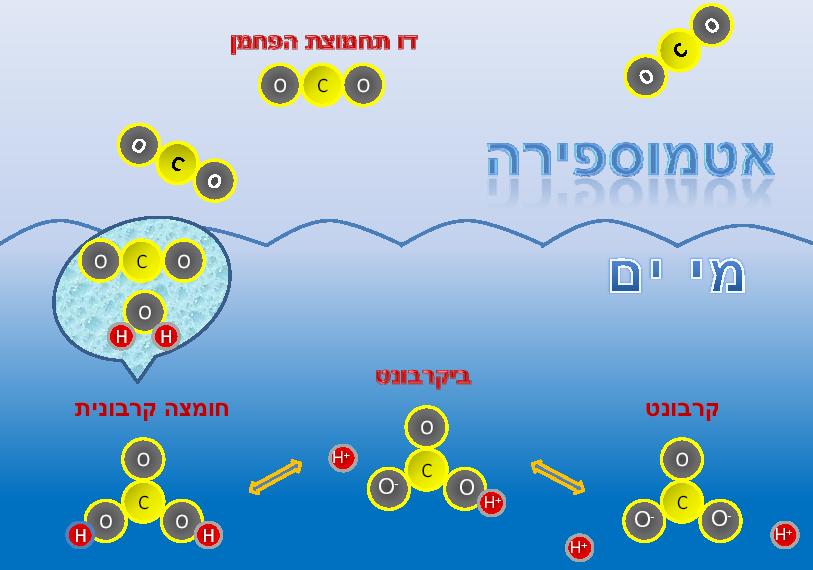The findings of a new study show that there is a need to re-evaluate one of the most negative effects on the environment of the increase in the concentration of the greenhouse gas carbon dioxide (CO2) in the atmosphere as a result of burning fuel: the increase in the concentration of the gas causes increasing acidification of sea water and insomnia among environmental scientists.

The findings of a new study show that there is a need to re-evaluate one of the most negative effects on the environment of the increase in the concentration of the greenhouse gas carbon dioxide (CO2) in the atmosphere as a result of burning fuel: the increase in the concentration of the gas causes increasing acidification of sea water and insomnia among environmental scientists. The scientists noticed this phenomenon only a few years ago and since then have been in a race against the clock with the aim of assessing, before it may be too late, the effect of the accelerated increase in seawater acidity on the continued existence of the vast diversity of marine life.
The findings of a new study suggest that there may be immediate consequences for the assessment of the effect of increasing the concentration of the greenhouse gas CO2 in the atmosphere as a result of burning fuel. The full findings of the study, conducted by Prof. Ehud Pines, head of the chemistry department at Ben-Gurion University of the Negev and Dr. Eric Niebring from the Born Customs Institute in Berlin, are being published these days in the prestigious scientific journal Science. Research partner on the Israeli side is Dr. Dina Pines.
The research of Pines and Niebring reports a breakthrough in the study of carbonic acid (H2CO3) in aqueous solutions. The carbonic acid derivatives HCO3-, CO32- are of primary importance in nature, since these derivatives are responsible for balancing the acidity level in the living body as well as for balancing the acidity level of the sea water. These derivatives are formed from the composition of the combustion gas carbon dioxide with water, but the existence of carbonic acid in water in its undecomposed form has not been proven so far. The present study convincingly shows that, contrary to the prevailing chemical convention, carbonic acid is a fairly stable acid in water and is more than 10 times stronger than acetic acid.
The research of Pines and Niebring may, as mentioned, have immediate consequences on the assessment of the effect of the increase in the concentration of the greenhouse gas - CO2 in the atmosphere as a result of burning fuel. One of the most problematic results of the constant increase in the concentration of carbon dioxide gas in the atmosphere is that, parallel to the increase in the concentration of the gas in the atmosphere, there is also an increase in the concentration of CO2 dissolved in the waters of the seas and oceans. The increase in the concentration of the gas causes increasing acidification of sea water and insomnia among environmental scientists who noticed this phenomenon several years ago and have since been in a race against the clock in order to assess, before it may be too late, the effect of the accelerated increase in the acidity of sea water on the continued existence of the enormous diversity of life the marine
Marine researchers hypothesized, among other things, that within a few decades there will be irreversible damage to corals as a result of the melting and weakening of their calcium skeleton. These marine studies have so far ignored the additional negative effect possible as a result of the increase in the concentration of the undissolved carbonic acid in seawater, an acid whose stable existence in water has now been proven by Pins and Niebring. Pines and Niebring's research indicates how difficult it is to assess the effect of human-made changes on the chemistry of the environment, the one that supports the existence of the world's biosphere, since a large part of the basic chemical processes occurring in the environment are still not sufficiently known to science.


6 תגובות
If we have learned anything from history it is that we have learned nothing from history D:
Good luck in the next incarnation..
As usual, they do research, and to get additional funding they start fantasizing about disasters.
Enough! You are damaging your credibility! and consequently the credibility of science in the eyes of the public.
You are doing enormous damage.
You should also find the history of the concentration of the aforementioned acid or acids over the ages, after all there were periods when the concentration of carbon dioxide was higher than now. Is anyone aware of any research on the matter?
And that's what the song says...
In the year 2525
Let's just hope that humanity is no longer a dead end in evolution..